
How to Redefine Feel-Good Food for Better Health Results
Traditionally, when you think of “feel-good food,” thoughts of sweet confections, crispity-crunchity fried creations, warm-soft delicate baked goods often come to mind. However, have you ever noticed that, more often than not, after consuming such pleasures your mind is quite satisfied while the body tends to feel a bit sluggish?
Why the Different Reactions?
Consider this: the mouth, where all things are consumed, happens to lie in between the body and the brain. Though all things within the body are controlled by the brain, how food is processed can often have two completely different outcomes.
As soon as something that tastes really good hits our palate, there are numerous chemical reactions and releases taking place on both sides.
The Brain Is Ecstatic
In the brain, we have a release of serotonin, dopamine, and oxytocin (love hormone also stimulated by dark chocolate!) which can create an almost euphoric reaction. This leaves us feeling happy, peaceful, satisfied, and content (primary contributor to food/sugar/carbohydrate addictions).
The Body Disagrees
The reaction that takes place from the mouth down is completely different. Simultaneously, as your favorite “guilty pleasure” is hitting your palate and triggering the brain, it is also triggering the body to prepare for digestion, nutrient absorption, energy replenishment, and energy storage!
Insulin, which is secreted from the pancreas, is the primary hormone responsible for this. Once a rise in blood sugar begins to occur based on what is consumed, the pancreas secretes insulin to begin the process of regulating these levels to prevent organ function abnormalities.
Another function of this hormone is to promote the storage of triglycerides (dietary fats) into adipose tissue (fat storage cells). The most prime environment for this takes place when high amounts of dietary sugars and fats are simultaneously present (think cookies, pie crust, donuts, pizza, lasagna, bread & butter, etc.).
What If You Can “Have Your Cake and Eat It Too”?
Believe it or not, but a daily diet of simple foods in modest portions will give you the best of both worlds. Below are some examples.
Things Which Feel Good to Both the Brain and the Body
- Whole foods consumed in their closest to raw/natural state (roasted/grilled lean proteins, steamed vegetables, raw fruits/berries, raw/lightly roasted nuts & seeds, foods prepared/dressed with cold-pressed oils (extra virgin olive oil, coconut oil), fresh herbs and spices, naturally dried fruits, etc.).
- Balanced meals to include: 60% complex carbohydrate, 25% lean protein, 15% healthy fats, which are modest in calories (no less than 300 and no more than 600*).* Used as a basic guide individual specifics will vary.
- Eating multiple balanced meals daily, no more than 6 and no less than 4 (approx. every 2 ½ – 3 hrs.) keeps energy levels up and blood sugar/insulin levels normalized (prevents dips/spiking).
- Drinking at least 8oz of pure water with each meal. This promotes digestive health and nutrient uptake.
Things Which Feel Good to the Brain But Are Bad to the Body
- High-calorie meals: typically anything over 500–600 total calories – which is very easy to do!
- Meals high in simple carbohydrates/sugars (baked goods, white rice, candy, sugary drinks, etc.): a meal containing more than 8g of simple carbohydrates is considered high in sugar.
- Processed foods; heat & eat foods, fast foods, pre-cooked foods, commercially preserved foods, etc. are all high in chemicals, nitrates, preservatives, flavor enhancers, color additives, etc. and are incredibly difficult for your body to metabolize and greatly inhibit the efficient metabolic function
- Dehydration: you MUST have sufficient water consumed daily for all of your body’s vital systems to operate efficiently (180oz per day for avg. adult). Your body is approximately 60% water and even dehydration of 10% can cause diminished metabolic function, labored digestion, increased cardiovascular demand (thicker blood), loss of energy, and diminished muscle function.
- Addictive substances: Alcohol, tobacco, illicit drugs, some supplements, anything which causes the body to work harder to break down/manage/utilize/metabolize creates stress and limits your energy and ability to burn calories efficiently.
Changing eating habits does not have to be an all-or-nothing proposition, and when you decide to trend toward a healthier way of eating, you do not have to eliminate the decadent things you enjoy.
These just become an occasional treat while you take away the feel-good feelings that come from the empowerment of having full control over what you eat and the energy boost that comes naturally from a naturally simple way of eating!
Which foods make you feel good? Are they good for you? Did you know about the different brain and body reactions to feel-good foods? Do you think you could start eating more healthy? What are you willing to eat less of for better health?
Tags Healthy Eating






